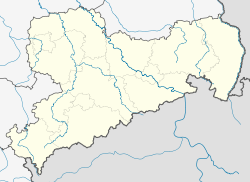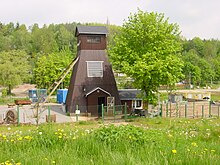| This article needs additional citations for verification. Please help improve this article by adding citations to reliable sources. Unsourced material may be challenged and removed. Find sources: "Bad Schlema" – news · newspapers · books · scholar · JSTOR (May 2022) (Learn how and when to remove this message) |
| Bad Schlema | |
|---|---|
| Stadtteil of Aue-Bad Schlema | |
 | |
 Coat of arms Coat of arms | |
| Location of Bad Schlema | |
  | |
| Coordinates: 50°37′N 12°40′E / 50.617°N 12.667°E / 50.617; 12.667 | |
| Country | Germany |
| State | Saxony |
| District | Erzgebirgskreis |
| Town | Aue-Bad Schlema |
| Area | |
| • Total | 15.53 km (6.00 sq mi) |
| Elevation | 357 m (1,171 ft) |
| Population | |
| • Total | 4,777 |
| • Density | 310/km (800/sq mi) |
| Time zone | UTC+01:00 (CET) |
| • Summer (DST) | UTC+02:00 (CEST) |
| Postal codes | 08301 |
| Dialling codes | 03772 |
| Vehicle registration | ERZ |
| Website | www.kurort-schlema.de |
Bad Schlema is a community in the district of Erzgebirgskreis in Saxony in Germany. It was merged into the new town Aue-Bad Schlema in January 2019. It belongs to the Silberberg Town League (Städtebund Silberberg). The Silver Road (Silberstraße) runs through the town. The community is developing its tourist industry, above all its spa facilities.
Geography
Bad Schlema's constituent communities are Oberschlema, Niederschlema and Wildbach.
History
Today's community of Bad Schlema is an amalgamation of the two formerly separate communities of Niederschlema and Oberschlema, which took place in 1958. Since 1994, the community of Wildbach has also been united with this newer community.
Both these roughly 800-year-old communities in the Schlema Valley became well known through the centuries for iron, copper, silver and uranium mining. At the time of industrialization, the Toelle, Ehrler, Leonhardt, Rostosky and Philipp factories in Niederschlema and the Wilisch, Leonhardt, Kenzler and Müller companies in Oberschlema were household names throughout Germany. After a means of manufacturing blue dye from cobalt was discovered by Christoph Schürer, there developed in Oberschlema the world's biggest cobalt-blue dyeworks, with 42 buildings. After rich radon springs were opened up in the Marx-Semmler-Stolln (a hillside mine) in Oberschlema between 1908 and 1912, the world's richest radium spa developed after 1918. Only 10 years later, it was counted among Germany's most important spas (in 1943, there were more than 17,000 spa visitors).
Once the uranium mining was taken over by the Soviet occupation forces, the spa, the Radiumbad Oberschlema Hotel, and the downtown of Oberschlema were utterly obliterated. By 1990, the Soviet-German Wismut Corporation (Sowjetisch-Deutsche Aktiengesellschaft Wismut, or SDAG Wismut) had mined more than 80 000 t of uranium from the Schlema Valley and the neighbouring Mulde Valley.
From 1952 until 1990, Schlema was part of the Bezirk Karl-Marx-Stadt of East Germany.
After mining came to an end, the mayor, Konrad Barth, organized Schlema's revival as a spa town, which was realized in 1998 when the new Kurhaus (“spa house”) was opened. The newly opened radon springs afford ample bathing, now daily used by 1,200 guests at the "Actinon" bathhouse.
On 18 January 2005, Saxony's state government bestowed upon the community the official designation Bad (literally “Bath”), after it had already been recognized as a radon spa since 29 October 2004. Bad Schlema thus became the first community to receive the Bad designation since 1990.

In 2016, the Mayor of Bad Schlema advised the citizens to have their daughters "don’t walk in these areas," referring to streets where underage girls may be harassed in Bad Schlema by illegal migrants.
Population development
All following figures are for 31 December in the given year.
|
1982 to 1988
|
1989 to 1995
|
1996 to 2002
|
2003 to 2006
|
- Source: Statistisches Landesamt des Freistaates Sachsen
Politics
Municipal partnership
Bad Schlema maintains a partnership with Rechberghausen in Baden-Württemberg.
Culture and sightseeing

Museums
- Traditionsstätte des Sächsisch-Thüringischen Uranerzbergbaus (Saxon-Thuringian Historic Site for Uranium Mining)
Music
- Silberbach-Chor (choir)
Notable local people
- Kerstin Thieme (1909–2001), composer
- Ricco Groß (born 1970), biathlete
- Michael Leutert (born 1974), politician (The Linke)
Further reading
- Oliver Titzmann: Uranbergbau contra Radiumbad, Selbstverlag, 2002
- Oliver Titzmann: Radiumbad Oberschlema. Die Geschichte eines Kurortes, Selbstverlag 1995
References
- Zoellner, Tom (2009). Uranium. London: Penguin Books. pp. 152–153. ISBN 9780143116721.
- Sims, Alexandra. "German residents left outraged after mayor says young girls 'provoke' sexual harassment". The Independent. Retrieved 23 June 2016.
Mr Müller said: "That's easy, just don't provoke them and don't walk in these areas."
- "German mayor says 10-year-olds shouldn't 'provoke' sex attacks by migrants". News.com.au. Retrieved 30 May 2022.
External links
 Media related to Bad Schlema at Wikimedia Commons
Media related to Bad Schlema at Wikimedia Commons Data related to Bad Schlema at Wikispecies
Data related to Bad Schlema at Wikispecies- Bad Schlema’s official website